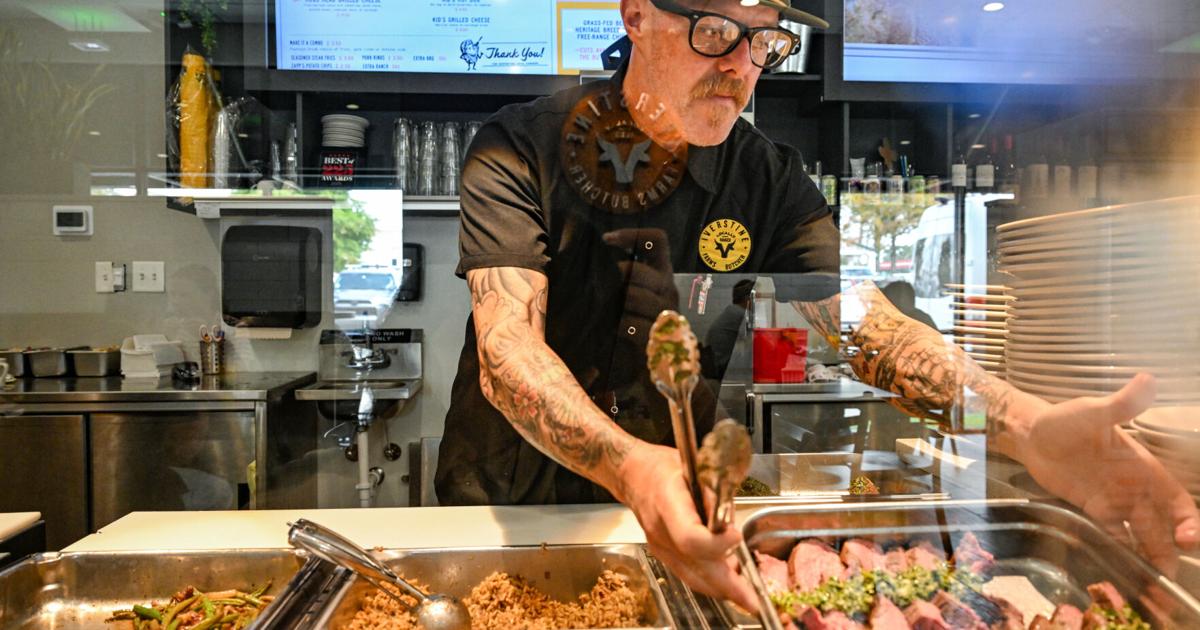Copyright Baton Rouge Advocate

The craft of butchering is a lost art, and this Baton Rouge butcher has not only preserved the craft but has trained both employees and the public on how to process meat. Iverstine Butcher, a whole-animal butcher shop and restaurant at 7731 Perkins Road, got its start in 2009 as a farm. Now closed, Iverstine Family Farms was located in Kentwood, Louisiana. Today, the business does things the old-fashioned way, said owner Galen Iverstine, by finding creative ways to use the whole animal and feature both desirable and undesirable cuts of meat. “We have this abundance of bones because we’re always working with whole animals,” Iverstine said. “So, we’re able to make a lot of bone stocks, which really builds flavor depth in all of our dishes.” The business also renders fats off the animals to create tallow and lard, which they can use in fryers, and snack sticks/jerkies are a good solution to using extra trims of meat. It’s a no shortcuts mentality, he said. Meat camp Iverstine doesn’t expect many applicants to have butcher skills. instead, he hires people with culinary experience and then trains them in the craft. Throughout the year, Iverstine Butcher hosts workshops and classes on topics like carcass anatomy, nutritional needs, butchering and how to buy meat. The workshops are led by Iverstine and his butchers, and they often have guests like nutritionist experts speak as well. “We call it meat camp where people come in and get hands-on with cutting,” he said. “There’s been this disconnect between people and where their food comes from, and, really, that’s part of our broader mission.” There’s no mystery to what the business is doing. They just do it well, he said. The butcher’s beginnings Baton Rouge born and raised, Iverstine graduated from Central High School. “I come from a family of really great cooks,” Iverstine said. “Before I got into the food industry, I was always the guy at the tailgates taking on the cooking.” In his early 20s, he spent time in places like Houston and New Hampshire, which influenced his perception of food and developed his palate, he said. He also lived in Hawaii for a year, just off the coast of Maui, and worked on a 60-foot, navigator tourism boat where he caught wild fish, cooked it up and served it to customers. He started the farm in 2009 and sold goods at the Red Stick Farmers Market. After his farm closed in 2022, the butcher shop and restaurant began sourcing ingredients from farmers in Louisiana and Mississippi, and during Thanksgiving season, they source turkeys from a farm in Ohio. “I’m forever grateful to the farmers market for being that kind of incubator to help us get a business started, because otherwise, that’s a daunting task,” he said. It was the launching point to start Iverstine Butcher in 2016, opening the original location just down the street from where it is now. “The goal of our business is always highlighting what’s going on on the butcher shop side,” Iverstine said. “That is the original vision of our business and still the driving force of it.” The menu The restaurant is an extension of the butcher shop, so the menu doesn’t shy from meat-heavy, heavenly dishes. It features a selection of burgers and sandwiches comprised of meats made in-house, and sides include pork rinds and fries. There's the "Daisy Duke" with fried, housemade bologna on sourdough bread with cheddar cheese, lettuce, pickled onions, mayonnaise and mustard. The smokehouse Reuben is made with housemade pastrami, sauerkraut, Swiss cheese and Russian dressing on dark rye bread. “It’s not like it’s on the menu because we need a Reuben on the menu,” Iverstine said. “It’s because we make really good pastrami on the butcher shop side, and we want to highlight that.” Iverstine said he thinks his butcher shop has the best burgers in town: The double butcher burger is made with two smash patties, pickles, tomatoes, onions, lettuce, mustard and mayonnaise on a brioche bun. On Wednesdays, customers can get a $5 single patty cheeseburger. Iverstine Butcher also offers plate lunch specials every day, featuring protein from the butcher shop like filet tips, which are the trims from the filet steaks. The breakfast menu has selections like boudin or sausage burritos as well as classics like French toast, bacon, eggs and a grits bowl with rib meat. The shop is offering a separate menu for Thanksgiving, including cooked and uncooked turkey, lamb cuts, bone-in bourbon ham and various cuts of beef. There are four Thanksgiving desserts and nine sides, including boudin rice dressing, spinach madeline (Iverstine’s favorite Thanksgiving dish), mashed potatoes and sweet potato casserole. Working with quality farms Iverstine works with several farmers in the South, mostly small farms in Louisiana and Mississippi. Like Iverstine, they highly value product quality. The business’ chickens and eggs come from Pearl River Pastures, a Mississippi farm using regenerative farming practices like rotational grazing, a process that prioritizes animal movement and ultimately improves soil health. All of the animals are pasture-raised and don't contain genetically modified organisms, commonly known as non-GMO. “I think a lot of us think we eat very well, but we’re not looking at where those food sources are coming from,” said Pearl River Pastures co-owner Summers White. White was introduced to regenerative farming in an organic farming class at the University of Alabama, and her history with health issues led her to work at a regenerative farm in Virginia. There, White grew a greater passion for the practice after her health improved. Regenerative farms take extra steps, like moving the animals, to ensure the health of the animals and environment, something White shows people on farm tours. Pearl River Pastures sells products at a higher price than traditional farms because of these extra steps, she said. Circle M Farms & Southern Maids Dairy, a local farm in Franklinton, provides goat milk dairy products to Iverstine Butcher, including goat cheese, goat milk and cheesecake. Most of the products are typically used in specials. “We’ve only been in the restaurant business for three years now,” Iverstine said. "And to be approached for something like that was kind of a high honor to see people are paying attention to what we’re doing and understand it’s something unique to Baton Rouge and really in the region.” People ask him often if he plans to open more locations. The answer is simple. “The reality is — this is not replicable,” Iverstine said. “It is what it is because of the history of it and the connections we’ve made over the years, the lessons we’ve learned over the years through farming, through farmers markets, through growing a business.” The butcher shop is one of a kind, and he hopes locals can support more businesses in the city to keep community businesses alive and strong.



